ETL tools are essential for managing and analysing data effectively, especially as businesses shift to cloud platforms. AI-powered ETL tools simplify complex processes by automating tasks like data transformation, quality monitoring, and compliance tracking. This makes them ideal for UK organisations navigating GDPR requirements while aiming to optimise costs and streamline operations.
Key Features to Look For:
- Cloud Compatibility: Multi-cloud and hybrid cloud support to avoid vendor lock-in and manage costs.
- AI Automation: Tools that offer schema detection, transformation suggestions, and predictive monitoring.
- Compliance and Security: Built-in GDPR compliance features, data residency controls, encryption, and access controls.
Top AI ETL Tools:
- Matillion: Cloud-first with native connectors for major platforms and GDPR-focused features.
- Fivetran: Fully managed pipelines with schema adaptation and error handling.
- Airbyte: Open-source flexibility with custom transformations and low-code tools.
- Informatica: Enterprise-grade governance and AI-driven insights.
- AWS Glue: Serverless service with automated scaling and seamless AWS integration.
Quick Comparison:
| Tool | Key AI Features | Cloud Support |
|---|---|---|
| Matillion | Transformation refinement, debugging | Multi-cloud (AWS, Azure, GCP, etc.) |
| Fivetran | Schema management, GenAI-ready models | Broad multi-cloud connectivity |
| Airbyte | Anomaly detection, AI-powered connector building | Cloud and on-premises support |
| Informatica | Metadata insights, policy enforcement | Enterprise multi-cloud support |
| AWS Glue | Schema inference, deduplication | Native AWS integration |
For UK businesses, selecting the right tool involves balancing technical needs, regulatory compliance, and budget constraints. A well-planned implementation ensures improved efficiency, reduced costs, and adherence to data protection laws.
Building ETL Pipelines With Generative AI
How to Choose AI ETL Tools
When selecting an AI ETL tool, UK businesses must weigh technical needs against regulatory requirements and budgetary constraints. Here’s a breakdown of the key architectural features to consider.
Cloud Integration and Architecture
For UK organisations, multi-cloud compatibility is essential. This avoids vendor lock-in and helps manage costs effectively. Ensure the tool integrates seamlessly with major platforms like AWS, Azure, and Google Cloud.
Hybrid cloud support is another critical feature. It allows businesses to keep sensitive data on-premises while taking advantage of cloud scalability. This is particularly important for organisations with strict data residency requirements.
Native connectors can save time and reduce maintenance headaches. Look for tools offering pre-built integrations with popular cloud data warehouses such as Amazon Redshift, Azure Synapse Analytics, or Google BigQuery.
Lastly, serverless architecture support can be a game-changer. It eliminates the need for capacity planning and helps cut costs by scaling resources automatically, especially during periods of fluctuating data volumes.
AI Automation Features
Modern AI ETL tools leverage automation to simplify complex processes. Features like intelligent schema detection and auto-generated transformation suggestions use machine learning to identify data types, relationships, and transformation needs. This reduces the manual effort required for pipeline setup.
Predictive pipeline monitoring is another must-have. It proactively detects potential failures, ensuring data quality while reducing the manual workload involved in resolving issues. Some tools even optimise resource allocation dynamically based on historical usage patterns.
For non-technical users, natural language query interfaces are a standout feature. These allow business users to create or modify data pipelines using plain English commands, reducing reliance on technical teams while maintaining governance.
As automation becomes more sophisticated, compliance remains a top priority.
Compliance and Security Requirements
For UK businesses, GDPR compliance is non-negotiable. Essential features include automated data lineage tracking, built-in right-to-be-forgotten functionality, and integrated consent management tools.
Data residency controls are vital for organisations that need to enforce UK-only or EU-only data processing and storage. The tool should allow for detailed control over where data resides.
When it comes to security, encryption standards should meet or exceed UK government guidelines. This includes end-to-end encryption for data in transit and at rest. Tools that support customer-managed encryption keys or integrate with enterprise key management systems offer an added layer of security.
Role-based access controls are crucial for maintaining strong governance. The tool should integrate with enterprise identity providers like Active Directory and offer detailed permissions aligned with your organisation’s policies.
Finally, compliance reporting automation can significantly reduce audit workloads. Tools that generate reports, track consent, and flag potential issues help organisations stay ahead of regulatory requirements while minimising manual effort.
Best AI ETL Tools for Cloud Platforms
Here’s a look at some of the top AI ETL tools designed to align with the needs of UK businesses. These solutions tackle various challenges, from automation to data governance, while addressing local compliance requirements.
Matillion
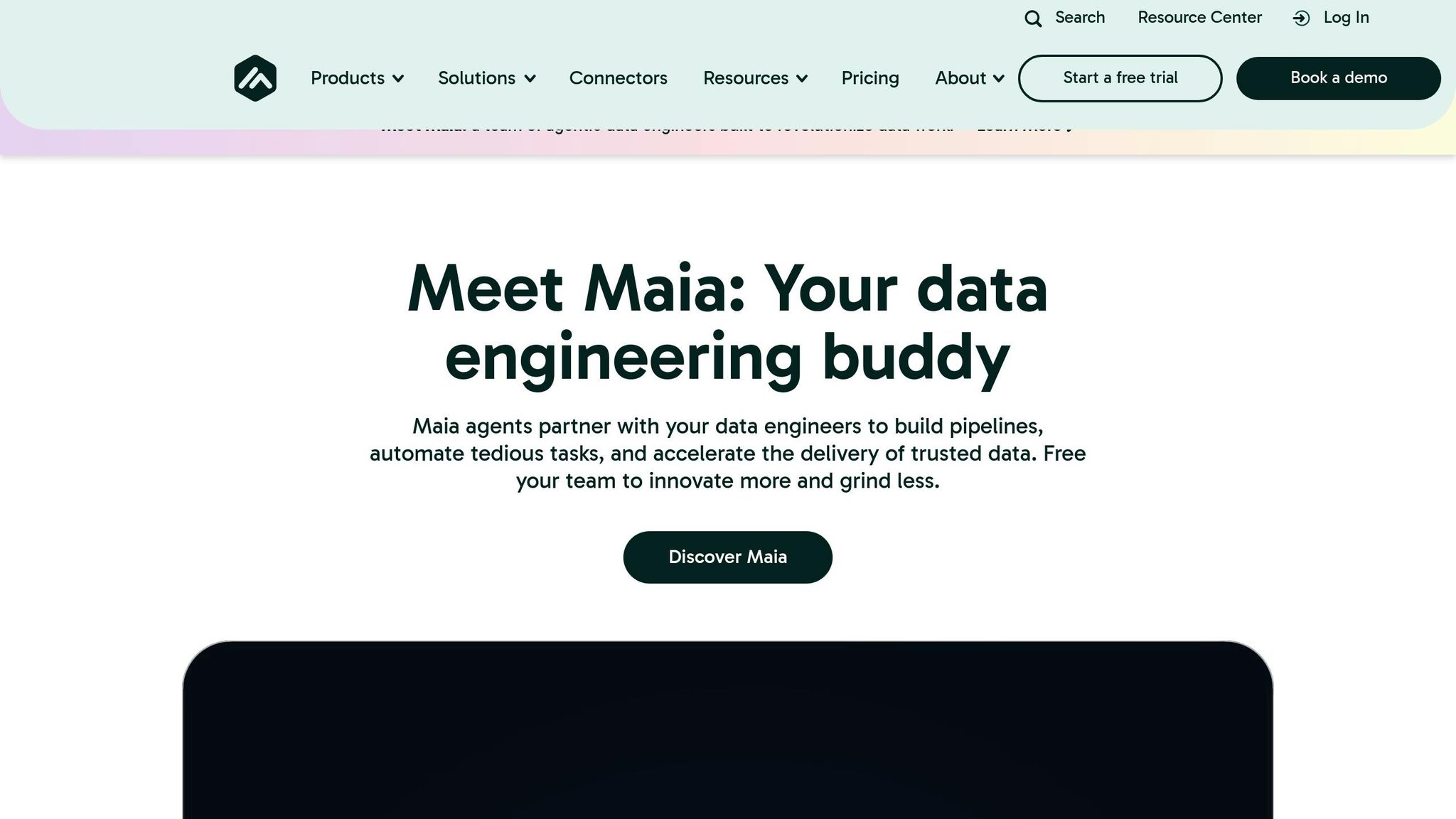
Matillion is a cloud-first ETL tool that supports multi-cloud environments with native connectors for platforms like Amazon Redshift, Snowflake, Google BigQuery, and Azure Synapse Analytics. Its push-down ELT method uses cloud computing resources efficiently, all while offering features such as data residency controls and audit trails to help businesses stay GDPR-compliant.
Fivetran
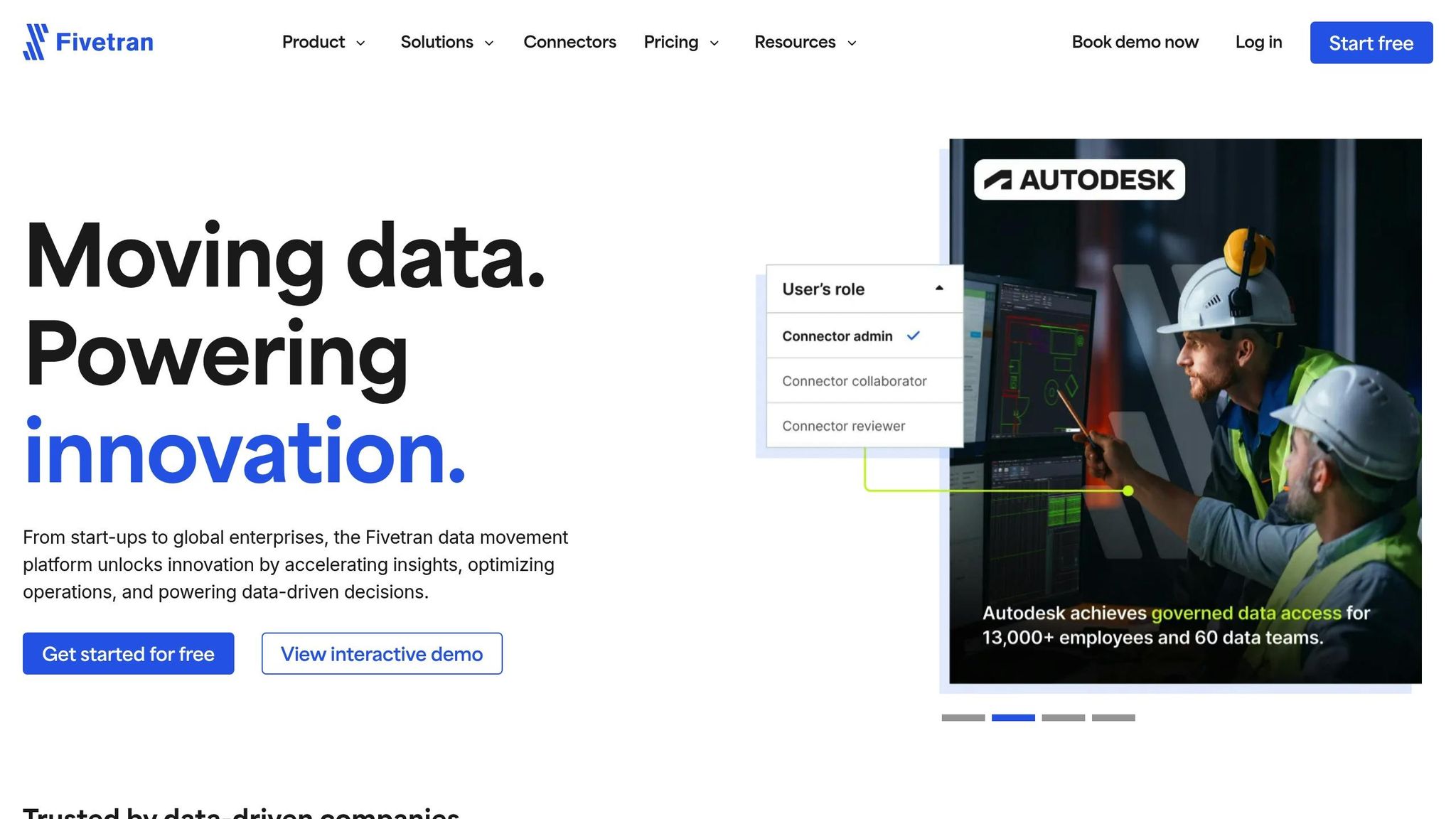
Fivetran simplifies data integration by fully managing pipelines. It automatically adapts to schema changes, provides robust error handling, and offers clear pipeline health reports. This allows teams to shift their focus from managing pipelines to analysing data.
Airbyte
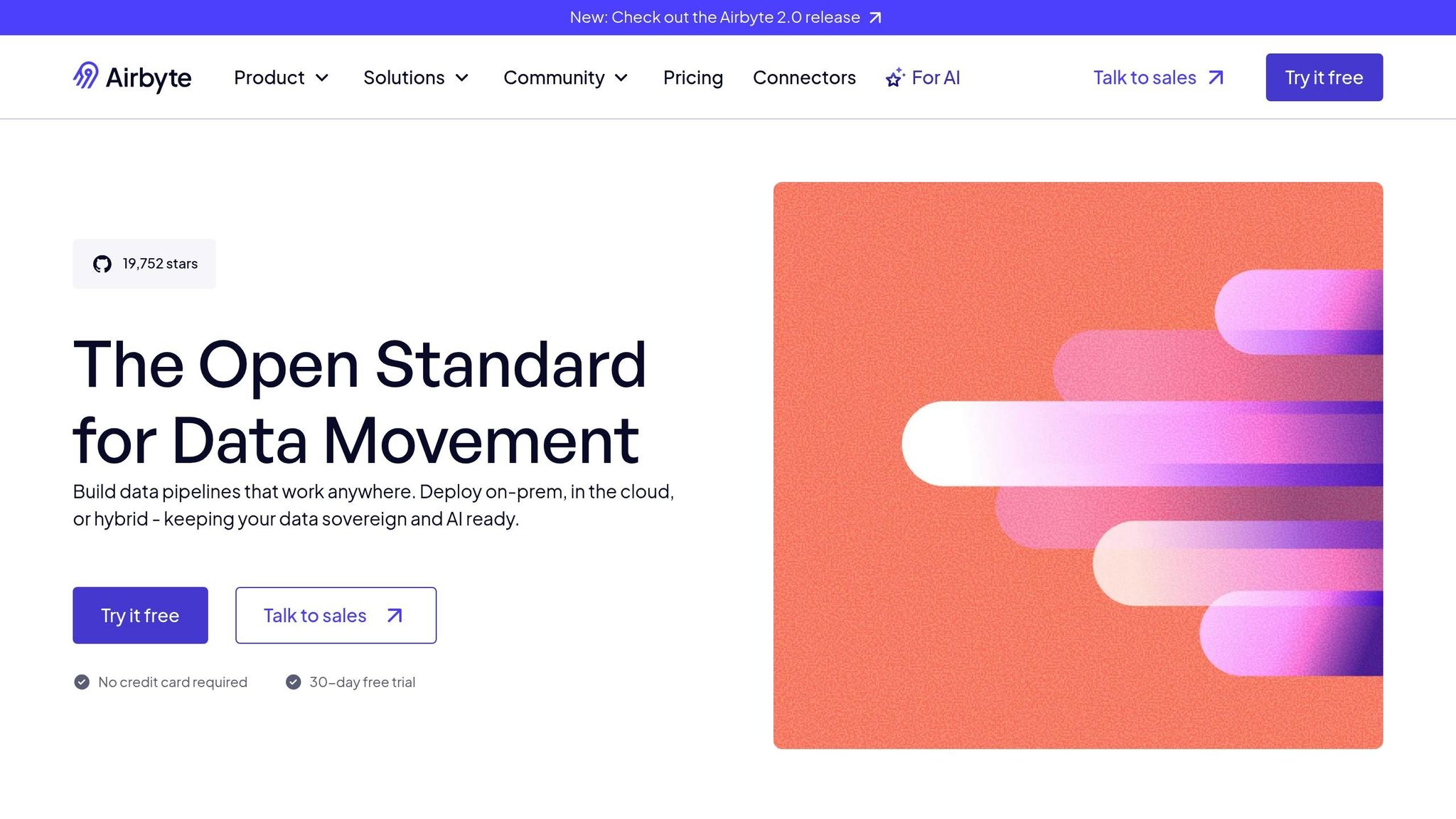
Airbyte is an open-source data integration platform that can be deployed in the cloud or on-premises. It provides transparency and flexibility, enabling users to modify connectors and design custom transformations to meet data sovereignty requirements. Its low-code connector kit and volume-based pricing make it a practical option for tailored integrations.
Informatica
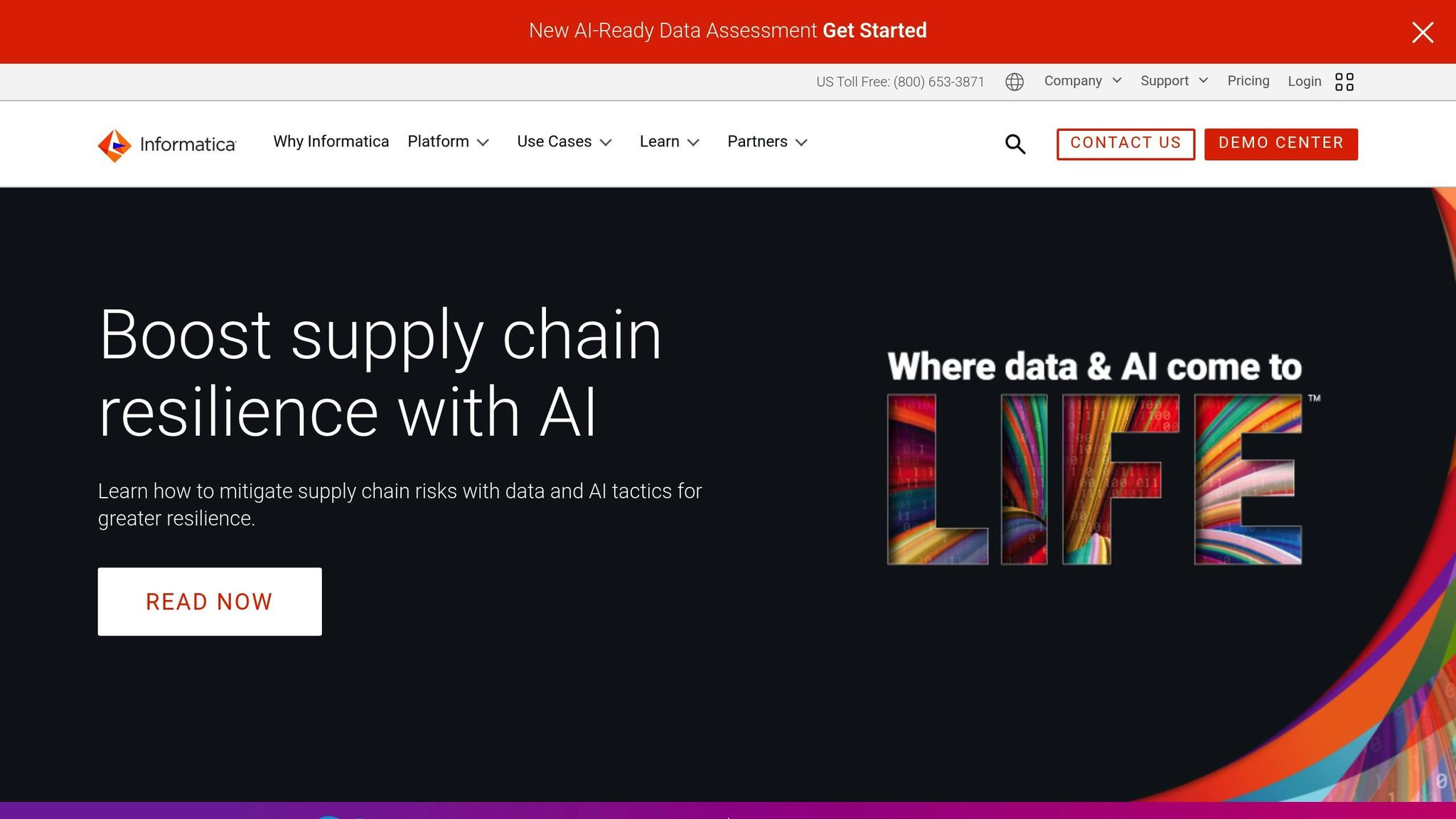
Informatica's Intelligent Data Management Cloud uses AI to improve data discovery, classification, and quality. It includes enterprise-level data governance tools like lineage tracking, impact analysis, and policy enforcement. Metadata-driven automation helps recommend transformations and identify quality issues, making it a powerful choice for complex data environments.
AWS Glue
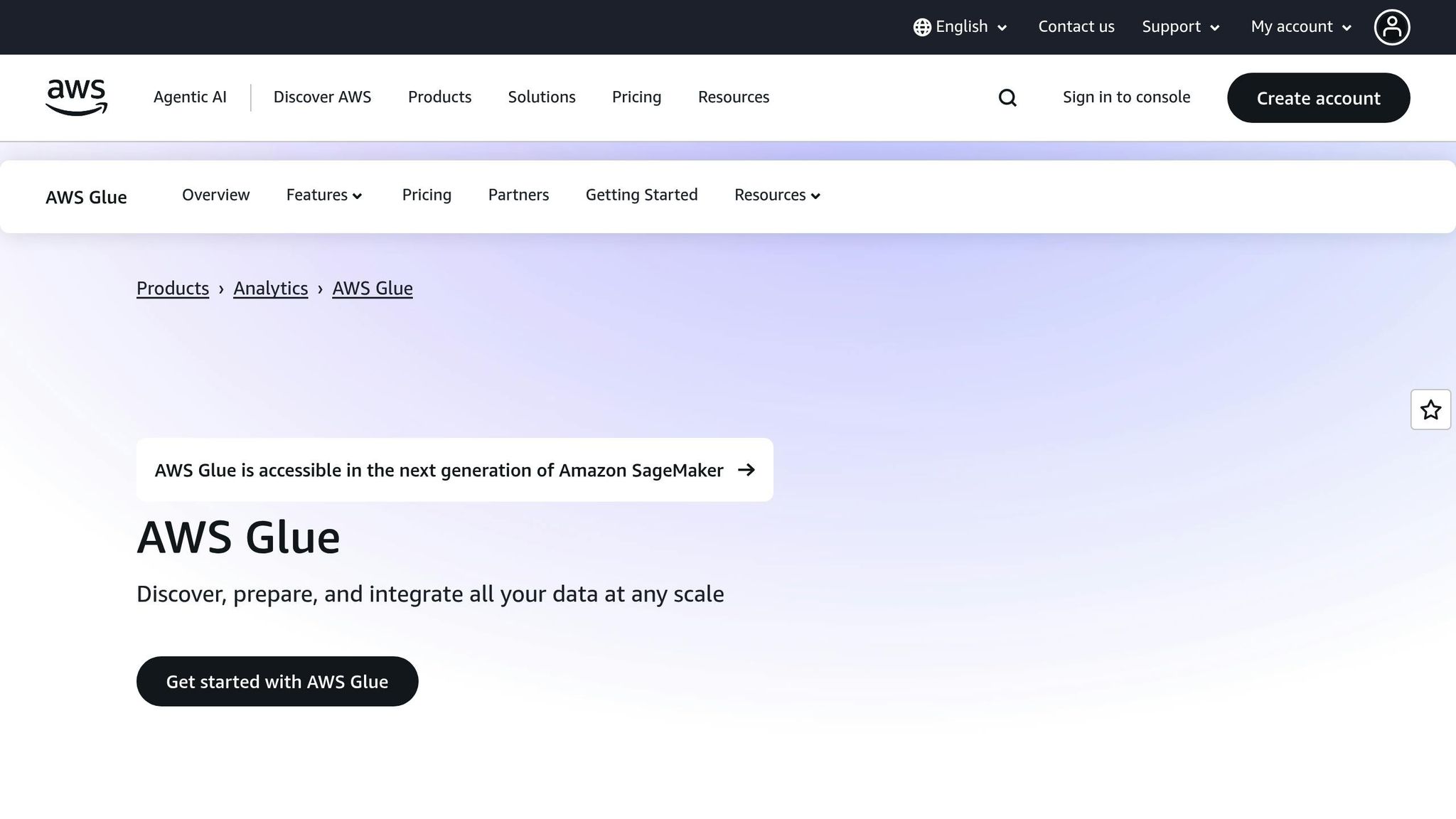
AWS Glue is a serverless ETL service that automatically scales computing power, eliminating the need for manual capacity planning. It integrates seamlessly with AWS services such as S3, Redshift, RDS, and DynamoDB. Key features include automated data cataloguing, classification, and quality checks. Its pay-as-you-go pricing model helps businesses manage cloud costs effectively.
Need help optimizing your cloud costs?
Get expert advice on how to reduce your cloud expenses without sacrificing performance.
Tool Comparison
Here's a breakdown of the AI features and cloud support offered by each tool, based on the selection criteria discussed earlier.
Comparison Table
| Tool | AI/ML Capabilities | Cloud Support |
|---|---|---|
| Matillion | Maia virtual data engineers that speed up pipeline creation, refine transformations, and debug tasks [2] | Multi-cloud (e.g. AWS, Azure, GCP, Snowflake) |
| Fivetran | AI-driven schema management, GenAI-ready data models, and automated data cleaning [4] | Broad multi-cloud connectivity |
| Airbyte | ML-based anomaly detection, AI-powered connector builder, and AI Assist for pipeline optimisation [1] | Supports both cloud and on-premises deployments |
| Informatica | CLAIRE AI engine offering metadata-driven insights, AI automation, AI copilots, and GenAI recipe templates [3] | Enterprise multi-cloud support |
| AWS Glue | ML Transforms for deduplication, automated schema inference, and data lineage tracking [1] | Native AWS integration |
Matillion's Maia virtual engineers streamline pipeline development, refine transformations, and troubleshoot tasks [2]. Fivetran simplifies schema management and data cleaning with GenAI-ready models [4]. Airbyte uses machine learning for anomaly detection and pipeline optimisation [1], while Informatica's CLAIRE AI engine provides enterprise-level metadata insights and automation [3]. AWS Glue, meanwhile, incorporates machine learning for deduplication and schema inference [1].
When it comes to cloud support, Matillion and Informatica offer extensive multi-cloud flexibility. Fivetran ensures broad connectivity across multiple cloud platforms. AWS Glue is built specifically for seamless integration with AWS, while Airbyte caters to both cloud and on-premises environments.
Next, discover how UK businesses can effectively implement these tools to enhance their operations.
Implementation Advice for UK Businesses
When UK businesses decide to implement AI ETL tools, they should prioritise cost efficiency, smooth integration with DevOps workflows, and strict adherence to data protection regulations. A well-thought-out strategy is essential to ensure these tools align with the organisation's broader cloud and operational goals.
Cloud Cost Reduction
AI ETL tools can help cut costs by automating laborious manual tasks and making better use of resources. Traditional ETL processes often demand significant manual oversight, but AI-powered tools can automatically adjust resource allocation based on data volume. This prevents over-provisioning during quieter periods, reducing unnecessary expenses and minimising the need for manual intervention.
Detailed usage analytics provide businesses with a clear view of inefficiencies, enabling more precise cost allocation. For example, Hokstad Consulting offers cloud cost engineering services that combine AI ETL automation with resource management strategies. Their No Savings, No Fee
model ensures businesses only pay when measurable reductions in cloud expenses are achieved.
These financial benefits also naturally enhance DevOps workflows.
DevOps Integration
Modern AI ETL tools are designed to integrate smoothly with Continuous Integration/Continuous Deployment (CI/CD) pipelines and infrastructure as code practices. This alignment ensures that data pipeline management fits seamlessly into existing application development processes, enabling version control and automated deployments.
Many platforms support containerised deployments and advanced orchestration techniques, allowing teams to capitalise on existing container management expertise. This simplifies operations while maintaining efficiency. Hokstad Consulting’s DevOps transformation services focus on these principles, helping organisations set up automated CI/CD pipelines, adopt infrastructure as code, and implement monitoring solutions that span both data and application layers.
While cost and operational efficiency are essential, compliance with data protection laws is non-negotiable.
UK Data Protection Compliance
For UK organisations, meeting GDPR and local data protection standards is a critical part of implementing AI ETL tools. Modern platforms often include robust data lineage tracking, which creates detailed audit trails to show how personal data is processed and transformed. This transparency is invaluable for handling subject access requests and demonstrating compliance during audits.
Strong encryption and strict access controls are key to safeguarding data. Many tools offer built-in features to protect data both in transit and at rest, with configurations tailored to meet UK-specific requirements. These include integration with local key management services and adherence to data residency standards. Automated data deletion capabilities ensure compliance with right-to-erasure requests, while detailed logging and reporting features simplify regular compliance audits.
Conclusion
Selecting the right AI ETL tool hinges on aligning it with your specific technical requirements, cloud strategy, and long-term goals. The key to success lies in balancing automation with cost management, seamless DevOps integration, and adherence to regulatory standards. These themes have been central throughout this discussion.
For businesses in the UK, challenges like maintaining cost efficiency and navigating GDPR compliance add layers of complexity. This is where expert support becomes invaluable. Hokstad Consulting specialises in helping organisations refine their DevOps workflows and optimise cloud infrastructure, with a focus on AI strategies and automation solutions. By combining technical know-how with practical cost management, their services range from cloud cost engineering to full-scale DevOps transformations.
One standout feature of Hokstad Consulting is their No Savings, No Fee
model. This ensures you only pay if measurable cloud cost reductions are achieved - a particularly appealing approach when dealing with intricate AI-driven data pipelines that demand careful resource allocation and continuous optimisation. Their expertise underscores the strategic benefits of a well-implemented AI ETL solution.
The earlier examples and tool comparisons highlight how each tool brings its strengths to tackle unique data and compliance challenges. Whether you’re transitioning from legacy ETL systems or designing entirely new AI-powered workflows, success depends on thorough planning and experienced guidance. The result? Enhanced performance, reduced costs, and more dependable data processing.
FAQs
How can AI-driven ETL tools help UK businesses meet GDPR requirements?
AI-driven ETL tools are proving invaluable for UK businesses striving to meet GDPR requirements, thanks to their ability to automate essential tasks. They help enforce data minimisation by ensuring only the necessary information is collected and processed. At the same time, they maintain comprehensive audit logs, which enhance transparency and accountability.
These tools also simplify managing data subject requests and make regular audits more efficient, enabling businesses to handle GDPR responsibilities more effectively. By promoting lawful, fair, and transparent data handling, AI-powered ETL tools play a key role in helping organisations adhere to GDPR principles while easing the compliance process.
Why should my organisation use a multi-cloud compatible ETL tool?
Using an ETL tool that works seamlessly across multiple cloud platforms can give your organisation a significant edge. By managing data workflows across various providers, you’re no longer tied to a single vendor. This approach not only reduces dependency but also lets you pick and mix the best services each provider offers.
On top of that, multi-cloud tools can help you keep costs under control and scale operations more effectively. They allow you to distribute workloads smartly, ensuring your data management remains agile and ready to meet evolving business demands. With reliable performance at its core, this flexibility makes multi-cloud compatibility an excellent choice for organisations aiming to stay ahead in their data strategies.
How do AI-powered features in ETL tools boost data pipeline efficiency and cut costs?
AI-driven capabilities in ETL tools simplify data pipelines by taking over repetitive tasks, cutting down on manual work, and lowering the risk of errors. This not only speeds up data processing but also boosts accuracy, allowing organisations to make decisions more quickly.
By improving resource allocation and refining data quality checks, these tools help businesses save time and reduce operational expenses. Over time, this leads to increased efficiency and smoother management of cloud data platforms.
